Can one man change the world? The life and work of Martin Luther prove the answer to that question is an unqualified, “yes.” Stephen Cornils of the Wartburg Theological Seminary details the rebellion that fractured a centuries-old religion and changed the course of history.
Church History
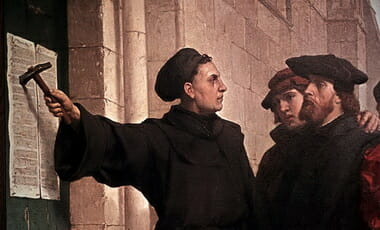

Are Roman Catholic Views of Tradition, Biblical?
This is from a larger debate between Ken Samples and Fr. Mitch Pacwa . I think this intro does it’s due diligence in explaining many of the false views I have heard from people as of late. In other words, one should not define Protestants as believing Sola Scriptura wrongly, and then responding to this false view.
The below is from an excellent book by William Webster:
- William Webster, Salvation, The Bible, and Roman Catholicism (Edinburgh, UK: Banner of Truth Trust, 1990), 13-20
AUTHORITATIVE STATEMENTS OF ROMAN CATHOLIC TEACHING ON TRADITION AND THE WORD OF GOD
The Documents of Vatican II
Hence there exist a close connection and communication between sacred tradition and sacred Scripture. For both of them, flowing from the same divine wellspring, in a certain way merge into a unity and tend toward the same end. For sacred Scripture is the word of God inasmuch as it is consigned to writing under the inspiration of the divine Spirit. To the successors of the apostles, sacred tradition hands on in its full purity God’s word, which was entrusted to the apostles by Christ the Lord and the Holy Spirit . . . Consequently, it is not from sacred Scripture alone that the Church draws her certainty about everything which has been revealed. Therefore both sacred tradition and sacred Scripture are to be accepted and venerated with the same sense of devotion and reverence. Sacred tradition and sacred Scripture form one sacred deposit of the word of God, which is committed to the Church.[1]
The Question and Answer Catholic Catechism
59. Where do we find the truths revealed by God?
We find the truths revealed by God in Sacred Scripture and Sacred Tradition.
60. How does Sacred Scripture compare with Sacred Tradition?
Both Sacred Scripture and Sacred Tradition are the inspired word of God, and both are forms of divine revelation. Sacred Scripture is divinely inspired writing, whereas Sacred Tradition is the unwritten word of inspired persons.[2]
89. Why is Sacred Tradition of equal authority with the Bible?
The Bible and Sacred Tradition are of equal authority because they are equally the word of God; both derive from the inspired vision of the ancient prophets, and especially from the infinite wisdom of God incarnate who gave to the apostles what he came down on earth to teach, through them, to all of mankind.[3]
TRADITION AND THE WORD OF GOD – SUMMARY OF NEW TESTAMENT TEACHING
The first issue to be addressed in any discussion of spiritual truth is that of authority. To say something is true or false implies an authoritative standard by which we can make such a judgment. But is there such an authoritative standard by which we can judge whether a particular teaching or system is true or false? The answer is an unequivocal ‘yes’. That authoritative standard is the Word of God, the Bible. Jesus Christ himself said of the Bible, ‘Thy word is truth’ (Jn. 17:17). In settling issues of spiritual controversy the Lord Jesus always appealed to the Word of God as an authoritative standard by which to judge truth and falsehood.
Mark’s Gospel records an incident in which certain Sad-ducees came to Jesus to question him. The Sadducees were the religious liberals of Jesus’ day and they rejected many of the teachings espoused by the more orthodox sect of the Pharisees. They did not believe in angels or in the resurrection of the dead. A number of these men came to Jesus to ask him a trick question about life after death. Jesus demolished their trick question but went on to say this:
Is this not the reason you are mistaken, that you do not understand the Scriptures, or the power of God?… But regarding the fact that the dead rise again, have you not read in the book of Moses, in the passage about the burning bush, how God spoke to him, saying, ‘I am the God of Abraham, and the God of Isaac, and the God of Jacob’? He is not the God of the dead, but of the living; you are greatly mistaken (Mk. 12:24,25-27 NASB 1963).
Twice in this passage Christ tells these men they are greatly mistaken in their views. The reason is that they do not understand the Scriptures. He appeals to those Scriptures to correct the false concepts these men held. He points to the Word of God as an authoritative standard by which to judge truth and error. These men are greatly mistaken because the views they hold and the doctrines they teach contradict the Word of God.
Here you have two opposing views of truth. One says there is no resurrection from the dead, the other says there is. How do you determine which is true? You go to the Word of God. The Lord Jesus Christ is the Son of God. He is God in human flesh and therefore whatever he teaches is absolute truth. And according to him the Word of God is the final and authoritative standard by which all claims to truth are to be judged.
This principle obviously has a direct bearing upon the whole issue of tradition. The Roman Catholic Church teaches that tradition as well as the Bible constitutes the revealed Word of God. It teaches that the teaching of the Church Fathers, the Church Councils, and the Traditions of the Church are all ‘one sacred deposit of the Word of God’.
John Hardon S. J. makes the following statements in his Question and Answer Catholic Catechism:
Sacred Tradition is the unwritten word of God that the prophets and apostles received through the inspiration of the Holy Spirit and, under His guidance, the Church has handed on to the Christian world.[4]
Both Sacred Scripture and Sacred Tradition are the inspired word of God, and both are forms of divine revelation. Sacred Scripture is divinely inspired writing, whereas Sacred Tradition is the unwritten word of inspired persons.[5]
Jesus Christ had some interesting things to say about tradition:
Then some Pharisees and scribes came to Jesus from Jerusalem, saying, ‘Why do Your disciples transgress the tradition of the elders? For they do not wash their hands when they eat bread.’ And He answered and said to them, `And why do you yourselves transgress the commandment of God for the sake of your tradition? For God said, “Honor your father and mother”… But you say, “Whoever shall say to his father or mother, ‘Anything of mine you might have been helped by has been given to God,’ he is not to honor his father or his mother.” And thus you invalidated the word of God for the sake of your tradition. You hypocrites, rightly did Isaiah prophesy of you, saying, “This people honors Me with their lips, but their heart is far away from Me. But in vain do they worship Me, teaching as doctrines the precepts of men”‘ (Matt. 15:1-9).
In a parallel passage in Mark 7:5-13 much of the same teaching by Jesus is recorded. The Pharisees ask why the disciples do not walk according to the tradition of the elders. In response Jesus denounces the scribes and Pharisees and their observance of tradition which is in violation of the Word of God. In effect they have elevated the teachings of men above the Scriptures. The following sums up Jesus’ evaluation:
- You teach as doctrines the precepts of men.
- Neglecting the commandment of God you hold to the tradition of men.
- You set aside the commandment of God in order to keep your tradition.
- You invalidate the Word of God by your tradition which you have handed down.
We should note that Jesus is not condemning tradition simply because it is tradition. All tradition is not wrong. What he is condemning is the elevating of tradition or the teaching of men to equality with the Word of God. He condemned the scribes and Pharisees for following tradition which violated and invalidated the Word of God. And then he rebuked them for so teaching others.
Tradition is not necessarily wrong, but tradition is not the Word of God, and for tradition to be acceptable to God, it must never contradict or violate the clear teaching of the Bible. All tradition must be judged by the truth of Scripture, including traditions which have their original roots in Scripture. The traditions that the scribes and Pharisees adhered to, but which Jesus denounced, were traditions which had their roots in mistaken interpretations of the Bible.
There is one obvious and definitive test which we can apply to all teaching and tradition to determine if it is true. That test is this: if the tradition or the teaching, even though it arises from the interpretation of a passage of Scripture, contradicts the clear teaching of another portion of Scripture, then that particular tradition or teaching is incorrect, for Scripture never contradicts Scripture.
The Word of God alone is our final authority, never tradition. We are told in 2 Timothy 3:16,17 that ‘All Scripture is inspired by God and profitable for teaching, for reproof, for correction, for training in righteousness; that the man of God may be adequate, equipped for every good work.’ All Scripture is inspired and is therefore authoritative. And because it is inspired, that is, because it is the Word of a self-consistent God, it will never contradict itself.
Consequently, we can judge whether or not a particular teaching or tradition is true by comparing it to the Word of God. If it is consistent with the Word of God, then we can accept it as truth. However, if it clearly contradicts the teaching of the Bible or makes the Word of God contradict itself, then we know that it is error, and is to be rejected. Otherwise we shall fall into the same condemnation which Jesus uttered against the Pharisees.
One question this whole issue brings up is this: can the true church of God fall into error? The answer to that question, based upon the history of God’s people in the Bible is ‘yes’. It is possible for the church leadership to fall into error and be led astray from the truth. For example, the apostle Peter was publicly rebuked by Paul for the hypocrisy of which he was guilty (Gal. 2:11-14).
On an earlier occasion the apostle Peter was rebuked by Christ because he tried to hinder the Lord from going to the cross. ‘But He turned and said to Peter, “Get behind Me, Satan! You are a stumbling-block to Me; for you are not setting your mind on God’s interests, but man’s”‘ (Matt. 16:23). The Lord Jesus actually addressed Peter as Satan, for Satan was using Peter to try to divert him from the will of God. This all transpired after Peter had been told that he was to be given the keys of the kingdom of heaven (Matt. 16:18-19).
Of course, the example of God’s chosen people, the Jews, during the time of the Lord Jesus himself, shows us clearly that it is possible for the church’s leadership to be deceived. Jesus’ words about tradition were spoken against the scribes and Pharisees, the religious leadership of God’s chosen people and the true church of that day. They had fallen into error and had become so blind that they failed to recognise
Jesus as the Messiah. They fell into the error of misinterpreting the Word of God and of elevating tradition and the teachings of the elders to a level equal in authority to the Scriptures, even though those teachings contradicted the Word of God. In addition to this Jesus claimed that the religious leadership of his day, because of their adherence to tradition and misinterpretation of Scripture, were actually responsible for hindering people from entering the kingdom of God: Woe to you lawyers! For you have taken away the key of knowledge; you did not enter in yourselves, and those who were entering in you hindered’ (Lk. 11:52). ‘But woe to you, scribes and Pharisees, hypocrites, because you shut off the kingdom of heaven from men; for you do not enter in yourselves, nor do you allow those who are entering to go in’ (Matt. 23:13). If this was true of the religious leadership of God’s chosen people in the day of Jesus Christ, there is absolutely no guarantee that a church leadership will not fall into error and mislead people.
Were the Pharisees and scribes of Jesus’ day intentionally trying to deceive people? Not necessarily! Many of them were doing what they sincerely felt was right. But they were wrong and consequently they were deceiving people and leading them astray. Sincerity is no guarantee against error. A man can be sincerely wrong. In the final analysis, as Christ taught, the Word of God is the final authority for determining what is truth and what is error. Any teaching which contradicts the Word of God must be rejected: ‘To the law and to the testimony: if they speak not according to this word, it is because there is no light in them’ (Is. 8:20, A.V.).
Luke records that when Paul came to Berea, and preached the gospel in the local Jewish synagogue, the Bereans ‘were more noble-minded than those in Thessalonica, for they received the word with great eagerness, examining the Scriptures daily, to see whether these things were so’ (Acts 17:11). The Bereans compared Paul’s doctrines with the Word of God to see if his teachings were consistent with the teachings of the Word of God. Only then would they accept the gospel he was preaching. They knew that any teaching that truly originates from God would not contradict what he had already revealed in his Word.
It is in this spirit that we shall examine the teachings of the Roman Catholic Church….
[1] Walter M. Abbot S.J., The Documents of Vatican II (Westchester, IL: Follett Publishing Co., 1966), 177.
[2] John A. Hardon, S.J., The Question and Answer Catholic Catechism (New York, NY: Image Books, Doubleday, 1981), 37.
[3] Ibid., 41.
[4] Ibid.
[5] Ibid., 41.

Is Christianity Bad News for Women? (Amy Orr-Ewing)
Center for Public Christianity (2017) – Amy Orr-Ewing delivers the 2017 Richard Johnson Lecture at NSW Parliament House.
Q & A

500-Years | A Man Named Luther (5-Sessions)
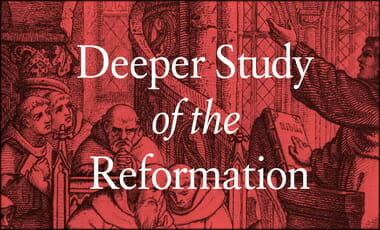
A Man Named Martin Luther – The Moment
A Man Named Martin: The Moment examines the errant teachings and wayward traditions of the Late Medieval Church that eventually sparked the Protestant Reformation, a theological overhaul set in motion most notably by Martin Luther’s nailing of the 95 Theses to the church door at Wittenberg.
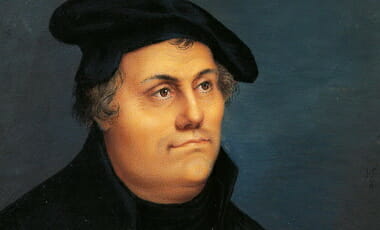
A Man Named Martin Luther – The Movement
Lutheran Hour Ministries (2017) – From Luther’s 95 Theses in 1517 to the Peace of Westphalia in 1648, God was at work in the Reformation. Fierce debates over Scripture, church doctrine, and late medieval church practice led to theological positions articulating salvation as God’s grace in action, with man being left to add nothing to his own salvation. In A Man Named Martin – Part 3: The Movement, viewers will see how the Reformation transformed European society and, eventually, left a profound impression around the globe.
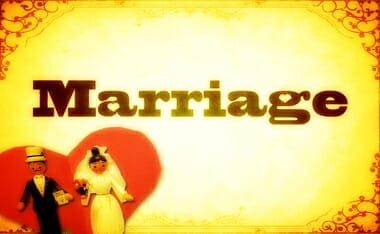
The “Office” of Marriage and Love in the Reformation
The reformers’ early preoccupation with marriage was driven, in part, by their jurisprudence. The starting assumption of the budding Lutheran theories of law, society, and politics was that the earthly kingdom was governed by the three natural estates of household, Church, and state. Hausvater, Gottesvater, and Landesvater; paterfamilias, patertheologicus, and patapofiticus— these were the three natural offices through which God revealed Himself and reflected His authority in the world. These three offices and orders stood equal before God and before each other. Each was called to discharge essential tasks in the earthly kingdom without impediment or interference from the other. The reform of marriage, therefore, was as important as the reform of the Church and the state. Indeed, marital reform was even more urgent, for the marital household was, in the reformers’ view, the “oldest,” “most primal,” and “most essential” of the three estates, yet the most deprecated and subordinated of the three. Marriage is the “mother of all earthly laws,” Luther wrote, and the source from which the Church, the state, and other earthly institutions flowed. “God has most richly blessed this estate above all others, and in addition, has bestowed on it and wrapped up in it everything in the world, to the end that this estate might be well and richly provided for. Married life therefore is no jest or presumption; it is an excellent thing and a matter of divine seriousness.”
The reformers’ early preoccupation with marriage was driven, in part, by their politics. A number of early leaders of the Reformation faced aggressive prosecution by the Catholic Church and its political allies for violation of the canon law of marriage and celibacy. Among the earliest Protestant leaders were ex-priests and ex-monastics who had forsaken their orders and vows, and often married shortly thereafter. Indeed, one of the acts of solidarity with the new Protestant cause was to marry or divorce in open violation of the canon law and in defiance of a bishop’s instructions. This was not just an instance of crime and disobedience. It was an outright scandal, particularly when an ex-monk such as Brother Martin Luther married an ex-nun such as Sister Katherine von Bora —a prima facie case of spiritual incest As Catholic Church courts began to prosecute these canon law offenses, Protestant theologians and jurists rose to the defense of their co-religionists, producing a welter of briefs, letters, sermons, and pamphlets that denounced traditional norms and pronounced a new theology of marriage.
Evangelical theologians treated marriage not as a sacramental institution of the heavenly kingdom, but as a social estate of the earthly kingdom. Marriage was a natural institution that served the goods and goals of mutual love and support of husband and wife, procreation and nurture of children, and mutual protection of spouses from sexual sin. All adults, preachers and others alike, should pursue the calling of marriage, for all were in need of the comforts of marital love and of protection from sexual sin. When properly structured and governed, the marital household served as a model of authority charity, and pedagogy in the earthly kingdom and as a vital instrument for the reform of Church, state, and society. Parents served as “bishops” to their children. Siblings served as priests to each other. The household altogether — particularly the Christian household of the married minister — was a source of “evangelical impulses” in society.
Though divinely created and spiritually edifying, however, marriage and the family remained a social estate of the earthly kingdom. All parties could partake of this institution, regardless of their faith. Though subject to divine law and clerical counseling, marriage and family life came within the ,jurisdiction of the magistrate, not the cleric; of the civil law, not the canon law. The magistrate, as God’s vice-regent of the earthly kingdom, was to set the laws for marriage formation, maintenance, and dissolution; child custody, care, and control; family property, inheritance, and commerce.
Political leaders rapidly translated this new Protestant gospel into civil law. Just as the civil act of marriage often came to signal a person’s conversion to Protestantism, so the Civil Marriage Act came to symbolize a political community’s acceptance of the new Evangelical theology. Political leaders were quick to establish comprehensive new marriage laws for their polities, sometimes building on late medieval civil laws that had already controlled some aspects of this institution. The first reformation ordinances on marriage and family life were promulgated in 1522. More than sixty such laws were on the books by the time of Luther’s death in 1546. The number of new marriage laws more than doubled again in the second half of the sixteenth century in Evangelical portions of Germany. Collectively, these new Evangelical marriage laws: (1) shifted primary marital jurisdiction from the Church to the state; (2) strongly encouraged the marriage of clergy; (3) denied that celibacy, virginity, and monasticism were superior callings to marriage; (4) denied the sacramentality of marriage and the religious tests and impediments traditionally imposed on its participants; (5) modified the doctrine of consent to betrothal and marriage, and required the participation of parents, peers, priests, and political officials in the process of marriage formation; (6) sharply curtailed the number of impediments to betrothal and putative marriages; and (7) introduced divorce, in the modern sense, on proof of adultery, malicious desertion, and other faults, with a subsequent right to remarriage at least for the innocent party. These changes eventually brought profound and permanent change to the life, lore, and law of marriage in Evangelical Germany.
John Witte, Jr., Law and Protestantism: The Legal Teachings of the Lutheran Reformation (Cambridge, United Kingdom: Cambridge University Press, 2002), 200-202.
God’s Ideal Should Be Mine
Persons should accept marriage not only as a duty that served society, but also as a remedy against sexual sin. Since the fall into sin, lust has pervaded the conscience of every person, the Lutheran reformers insisted. Marriage has become an absolute necessity of sinful humanity, for without it, the person’s distorted sexuality becomes a force capable of overthrowing the most devout conscience. A person is enticed by his or her own nature to prostitution, masturbation, voyeurism, homosexuality, and sundry other sinful acts. The gift of marriage, Luther wrote, should be declined only by those who have received God’s gift of continence. “Such persons are rare, not one in a thousand, for they are a special miracle of God.” The Apostle Paul has identified this group as the permanently impotent and the eunuchs; few others can claim such a unique gift.
This understanding of the created origin and purpose of marriage un-dergirded the reformers’ bitter attack on celibacy and monasticism. To require celibacy of clerics, monks, and nuns was beyond the authority of the church and ultimately a source of great sin. Celibacy was for God to give, not for the church to require. It was for each individual, not for the church, to decide whether he or she had received this gift. By demanding monastic vows of chastity and clerical vows of celibacy, the church was seen to be intruding on Christian freedom and violating scripture, nature, and common sense. By institutionalizing and encouraging celibacy the church was seen to prey on the immature and the uncertain. By holding out food, shelter, security, and opportunity, the monasteries enticed poor and needy parents to condemn their children to celibate monasticism. Mandatory celibacy, Luther taught, was hardly a prerequisite to true service of God. Instead, it led to “great whoredom and all manner of fleshly impurity and… hearts filled with thoughts of women day and night.” For the consciences of Christians and non-Christians alike are infused with lust, and a life of celibacy and monasticism only heightens the temptation.
John Witte, Jr., From Sacrament to Contract: Marriage, Religion, and Law in the Western Tradition (Louisville, KY: Westminster John Knox Press, 1997), 50.
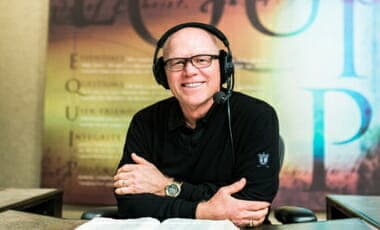
Hank Hanegraaff’s Conversion (Friel, White, Craig)
(A good quick summation of Orthodoxy can be found here at GOT QUESTIONS) Here is WRETCHED’s take:
(Below) A two hour program today playing nearly 50 minutes worth of comments (ok, at 1.2x speed!) by Hank Hanegraaff relating to his conversion to Eastern Orthodoxy and asking the simple question: can an Eastern Orthodox believer function as the Bible Answer Man? Important issues to be sure!
I have to include this discussion by William Lane Craig on the matter:

The Apocrypha vs. Jesus
(I change the links to the Scripture references from their original source.) While there are many reasons to reject the Apocrypha as on par with Scripture, the main reason is the testimony of Christ. Here for instance is an article from the BLUE LETTER BIBLE by Don Stewart (a co-author on many works with Josh McDowell) giving 27-reasons to reject the Apocrypha as equal to Scripture… the most important point being his #27:
27. JESUS’ TESTIMONY IS DEFINITIVE
It is clear that in the first century the Old Testament was complete. Jesus put His stamp of approval on the books of the Hebrew Old Testament but said nothing concerning the Apocrypha. However, He did say that the Scriptures were the authoritative Word of God and they could not be broken. Any adding to that which God has revealed is denounced in the strongest of terms. Jesus asked the religious leaders a penetrating question.
Why do you break the command of God for the sake of your tradition? (Matthew 15:3).
Jesus’ And The Extent Of The Old Testament
A statement by Jesus seemingly gives His belief in the extent of the Old Testament.
Therefore I send you prophets, sages, and scribes, some of whom you will kill and crucify, and some you will flog in your synagogues and pursue from town to town, so that upon you may come all the righteous blood shed on earth, from the blood of righteous Abel to the blood of Zechariah son of Barachiah, whom you murdered between the sanctuary and the altar. Truly I tell you, all this will come upon this generation (Matthew 23:34-36).
He mentions Abel and Zechariah as the first and last murder messengers of God that were murdered. Abel’s murder is mentioned in Genesis while Zechariah’s was in 2 Chronicles – the last Old Testament book in the Hebrew canonical order. The fact that these two are specifically mentioned is particularly significant. There other murders of God’s messengers recorded in the Apocrypha. Jesus does not mention them. This strongly suggests He did not consider the books of the Apocrypha as part of Old Testament Scripture as with the books from Genesis to 2 Chronicles.
THERE WAS MORE TESTIMONY FROM JESUS
Jesus gave further testimony of the extent of the Old Testament canon in the day of His resurrection. He said.
How foolish you are, and how slow of heart to believe all that the prophets have spoken! . . . And beginning with Moses and all the Prophets, he explained to them what was said in all the Scriptures concerning himself (Luke 24:25,27).
Note Jesus’ emphasis on “all that the prophets had spoken.” Later He explained the extent of “all that the prophets had said.”
He said to them, “This is what I told you while I was still with you: Everything must be fulfilled that is written about me in the Law of Moses, the Prophets and the Psalms” (Luke 24:44).
This is a reference to the threefold division of the Hebrew Scripture. They constitute “all that the prophets said.” There is no reference to the Apocrypha. It would not have been part of the threefold division of the Old Testament.
So, even if an early church father thought the Apocrypha should be included as Holy Scripture, he would be wrong (see also CARM). STAND TO REASON basis their article on the matter on this point by Jesus:
Should the Bible include the Apocrypha? Here is where I think Jesus can help. Specifically, I believe Jesus’ words lead us to the conclusion that the Apocrypha is not Scripture.
During one of His heated discussions with the Pharisees and the lawyers, Jesus says,
Therefore also the Wisdom of God said, “I will send them prophets and apostles, some of whom they will kill and persecute,’ so that the blood of all the prophets, shed from the foundation of the world, may be charged against this generation, from the blood of Abel to the blood of Zechariah, who perished between the altar and the sanctuary. Yes, I tell you, it will be required of this generation.” Woe to you lawyers! For you have taken away the key of knowledge. You did not enter yourselves, and you hindered those who were entering. (Luke 11:49–51)
First, notice that Jesus mentions the blood of all the prophets. He’s not talking about some of the prophets. He’s talking about the blood of all the prophets since that foundation of the world. Next, Jesus limits who He includes with “all the prophets.” He gives us some bookends for identifying these prophets. In verse 50, Jesus says, “…from the blood of Abel to the blood of Zechariah.”
Abel is the very first prophet to die for his faith. The death of Abel is recorded in Genesis—the first book of the Jewish Scriptures. Jesus also cites the death of Zechariah as the last prophet to die. However, this isn’t right. Zechariah isn’t the last prophet to die. Chronologically speaking, Uriah—the son of Shemaiah—is the last prophet killed. You can read about his death in Jeremiah 26:20–23.
So why does Jesus list Zechariah as the last prophet to die? The reason is crucial to why we shouldn’t accept the Apocrypha as Scripture. Jesus chose Abel first and Zachariah last because they were the first and last prophets martyred in the Jewish Scriptures. The Jews of Jesus’ day would have known that Zechariah’s death is recorded in Chronicles—the last book of the Jewish Scriptures. It reads,
Then the Spirit of God clothed Zechariah the son of Jehoiada the priest, and he stood above the people, and said to them, “Thus says God, ‘Why do you break the commandments of the Lord, so that you cannot prosper? Because you have forsaken the Lord, he has forsaken you.’” But they conspired against him, and by command of the king they stoned him with stones in the court of the house of the Lord. (2 Chronicles 24:20–21)
Therefore, Jesus limits “all the prophets” to the Jewish Scriptures—from Genesis to Chronicles. It was the prophets contained in the Jewish Scriptures, and no others, who were responsible for communicating God’s word until the time of Christ. The author of Hebrews writes, “Long ago, at many times and in many ways, God spoke to our fathers by the prophets, but in these last days He has spoken to us by his Son, whom He appointed the heir of all things, through whom also He created the world” (Hebrews 1:1–2)….
Oh, BTW, I am a big fan of that guy, Jesus.

Tradition: Catholic/Protestant Views
Gregg Allison and Chris Castaldo, The Unfinished Reformation: What Unites and Divides Catholics and Protestants After 500 Years (Grand Rapids, MI: Zondervan, 2016), 68-72.
…. How does God speak to the world through such revelation? A major difference between Catholics and Protestants is found in the answer to this question.
Catholics affirm that God speaks to the world through Tradition and Scripture. Similar to the twofold way that Jesus’ apostles communicated the gospel—orally, through preaching, and in writing, through the biblical text—so God communicates to his people today in a twofold pattern: the teaching, or Tradition, of the Church’s bishops, who are the successors of the apostles, and Scripture. “Sacred Tradition and Sacred Scripture are bound closely together and communicate one with the other. For both of them, flowing out of the same divine well-spring, come together in some fashion to form one thing and move toward the same goal” (CCC 80). Thus, these two modes are two streams of one source of divine authority.
Tradition is “the Word of God which has been entrusted to the apostles by Christ the Lord and the Holy Spirit” (CCC 81). This oral communication was in turn handed over by the apostles to their successors, the bishops of the Church, who maintain this Tradition and, on occasion, proclaim it as Church doctrine. For example, the Church declares the immaculate conception of Mary and her bodily assumption (to be treated later) as part of Tradition. The other mode of divine revelation is Scripture. Though Catholics and Protestants stand together in their belief that the Bible is the God-breathed, written revelation of God, they part company on many other points in their understanding of Scripture. Significantly, the Catholic Church “does not derive her certainty about all revealed truths from the holy Scriptures alone. Both Scripture and Tradition must be accepted and honored with equal sentiments of devotion and reverence” (CCC 82).
Against the Catholic affirmation of Scripture and Tradition as authoritative divine revelation, Protestants assert the principle of sola Scriptura: Scripture, and Scripture alone, is authoritative divine revelation. God speaks to the world through his Word, which is written Scripture only, not Scripture plus Tradition. This Protestant critique of Tradition is grounded on several points.
First, Protestants believe that the Catholic position has thin biblical support. For example, to buttress their position, Catholics appeal to Jesus’ explanation to his disciples: “I still have many things to say to you, but you cannot bear them now” (John 16:12). They claim this passage as an example of Jesus underscoring the necessity of both Scripture and Tradition—what he could reveal to them as he was speaking with them, and what he would need to reveal to them later, when they were able to absorb it.
The Protestant response insists that this interpretation misses the point of that interaction. It is simply telling us that as Jesus was speaking with his disciples, they could not grasp his revelation—what he was saying to them at that moment. Indeed, in short order, they would express utter confusion about his impending death (John 16:16-24). Even when they thought they could understand the unfolding calamity, Jesus informed them that they would all abandon him (John 16:25-33), and soon afterward devil-prompted Judas was poised to betray him (John 13:2; 18:1-8), and Peter denied ever knowing Jesus (John 18:15-18, 25-27).
Following Jesus’ crucifixion and resurrection, however, the disciples received the Holy Spirit. As Jesus had promised, the Spirit taught the disciples all things, brought to their remembrance all that Jesus had said to them, and guided them into all the truth (John 14:26; 16:13). Having removed the prior dullness and ignorance that had characterized the disciples, the Holy Spirit moved those who wrote Scripture to communicate the whole of divine revelation (our New Testament). This work was exactly what Jesus taught about his sending the Holy Spirit to inspire them to write Scripture. Protestants believe that, understood in context, there was no need for supplemental communication—Tradition—alongside of Scripture.1
Second, Protestants believe that the Catholic view has thin historical support as well. It is true that the apostles communicated the gospel both orally, through their preaching, and eventually in writing, through the New Testament. But when Paul points out “so then, brothers, stand firm and hold to the traditions that you were taught by us, either by our spoken word or by our letter” (2 Thess. 2:15), he is not saying that his oral teaching and his written communication consisted of different revelations which supplement each other. On the contrary, these two delivery systems presented the same divine revelation. The difference was in the form, not the content.
The early church did have a type of tradition: the doctrine that the apostles transmitted provided a proper understanding of Scripture and underscored sound doctrine. It stood in opposition to the wrong biblical interpretations of the time and the misguided beliefs of heretics. The early church’s “rule of faith” or “canon (standard) of truth” was a summary of its essential doctrines based on Scripture. The early creeds—for example, the Apostles’ Creed and the Chalcedonian Creed—affirmed the doctrines of the Trinity and of Christ derived very carefully from Scripture. Protestants embrace this type of tradition, finding it to be a fine source of wisdom from the past. But this is far from the Catholic notion of Tradition.
In fact, it was not until the fourteenth century that the Catholic Church began to make novel claims about Tradition, granting unwritten communication by Church leaders authoritative status as doctrine outside of, and in addition to, Scripture. Such an idea of Tradition is a relatively late development and is quite different from the notion as found in Scripture and in the early church.2
Standing opposed to the Catholic view of Scripture and Tradition as two modes of divine revelation, Protestants hold to the sufficiency and necessity of Scripture. Scripture is sufficient in that it provides everything that people need to be saved from sin and death, and everything that Christians need to please God fully. Specifically, God-breathed Scripture equips believers “for every good work” (2 Tim. 3:16-17). Protestants see doctrines like the immaculate conception and bodily assumption of Mary as unnecessary and unbiblical. Protestants don’t need these doctrines to possess and believe the fullness of divine revelation. They don’t need practices like the sacrament of penance and praying for the dead in order to know and do all that God requires of them. They don’t need to believe that when they take the Lord’s Supper, the bread and the wine are transubstantiated into the body and blood of Christ. These doctrines, practices, and beliefs are extra-biblical, not from Scripture alone. Thus, Scripture’s sufficiency and the principle of sola Scriptura—”Scripture alone”—are closely connected and contradict the need for Catholic Tradition.3
Scripture is necessary in that it is essential for knowing the way of salvation, for progressing in godliness, and for understanding God’s will. To put it another way, apart from Scripture there can be no awareness of salvation, growth in holiness, and knowledge of God’s will.4 Catholics, on the other hand, would maintain that Scripture is necessary for the well-being of the Church: for the Church to be robustly all that God intends it to be, Scripture is necessary. But Catholics would not hold that Scripture is necessary for the being of the Church: if Scripture were to be lost, the Church could still exist because it would still have Tradition, part of divine revelation. Protestants insist that the Church would lose its way without Scripture: if Scripture were to be lost, the Church would cease to exist because all of divine revelation would have disappeared.
How does God speak to the world? Catholics respond to this question by saying “through Scripture and Tradition.” Protestants reply, “through Scripture alone.”
FOOTNOTES 1. This affirmation does not mean that Protestantism ignores or rejects the theological wisdom that it has inherited from the church throughout the ages (a point to be made shortly). 2. Factors that contributed to this development included: (1) exaggerated and indefensible claims for papal authority not only over the Catholic Church but the entire world as well; (2) theoretical debates over which of the two options—the authority of Scripture and the authority of the Church—is supreme; (3) the introduction of the idea of apostolic succession; and (4) the novel claim that, because the Church had determined the canon of Scripture, the Church therefore possesses special revelation that is not found in Scripture. See Gregg R. Allison, Historical Theology: An Introduction to Christian Doctrine (Grand Rapids: Zondervan, 2011), especially chapters 4 and 3. In more detail, Protestants gratefully use tradition (not Tradition, as in the Catholic sense), or wisdom from the past, as a servant to help their churches engage in the proper understanding and application of Scripture and the formulation of sound doctrine. 4. This attribute does not mean that people have to possess a written copy of Scripture and be able to read it. Rather, in the case of the majority of people today in whose language Scripture has yet to be translated and/or if those people are illiterate, they only need to be able to understand oral communication. Scripture read and heard is God’s necessary Word for them.
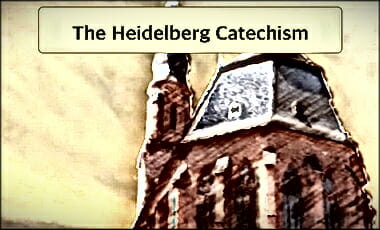
Zacharias Ursinus | Caspar Olevianus (Heidelberg Catechism)
Zacharias Ursinus (1534-1583), a sixteenth century German theologian, born Zacharias Baer in Breslau (now Wroc?aw, Poland). Like all young scholars of that era he gave himself a Latin name from ursus, meaning bear. He is best known as a professor of theology at the University of Heidelberg and co-author with Caspar Olevianus (1536-1587) of the Heidelberg Catechism…. (THEOPEDIA)
The Heidelberg Catechism is a document used in Reformed churches to help teach church doctrine. It takes the form of a series of questions and answers to help the reader better understand the material. It has been translated into many languages and is regarded as the most influential Reformed catechism.
Elector Frederick III, sovereign of the Palatinate from 1559 to 1576, appointed Zacharias Ursinus and Caspar Olevianus, to write a Reformed catechism based on input from the leading Reformed scholars of the time. One of its aims was to counteract the teachings of the Roman Catholic Church regarding theology, basing each statement on the text of the Bible…… (THEOPEDIA)
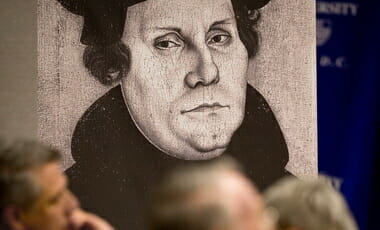
The Insanity of Luther (R. C. Sproul)
R. C. Sproul’s popular lecture on Protestant Reformer Martin Luther.
- 2 of 3
- « Previous
- 1
- 2
- 3
- Next »